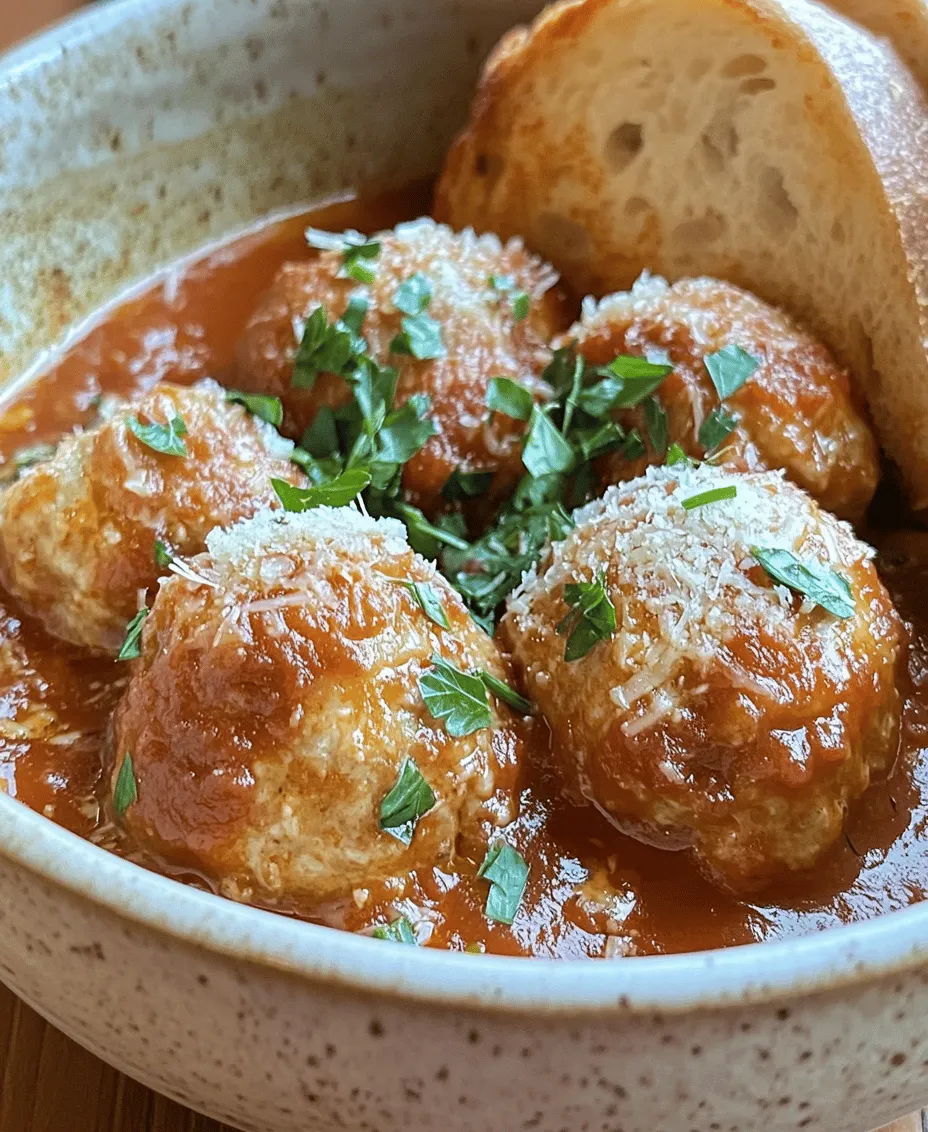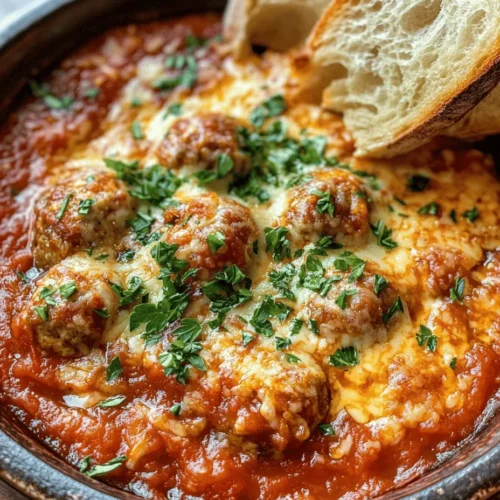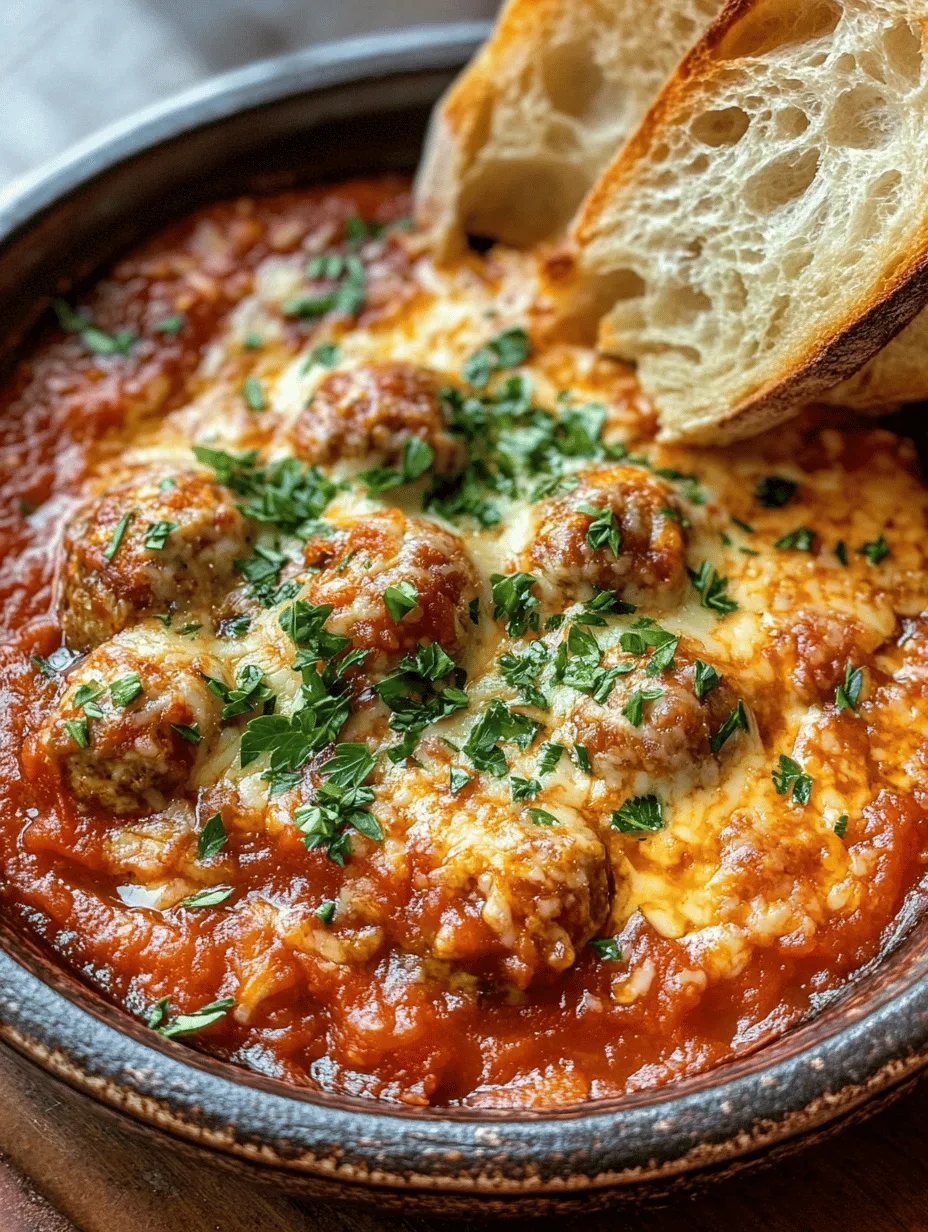Introduction
In recent years, turkey meatballs have surged in popularity, emerging as a healthier alternative to traditional beef or pork meatballs. Not only do they offer a lighter option that is lower in fat, but they also boast a high protein content, making them an ideal choice for health-conscious diners. Families and individuals alike are embracing turkey meatballs for their versatility; they can be incorporated into various cuisines, whether served with a classic marinara sauce, nestled in a sub sandwich, or tossed into a hearty soup. This recipe for Turkey Meatballs with Marinara Sauce promises to be a delightful addition to your meal rotation, providing a simple, satisfying, and nutritious option for any day of the week.
Understanding Turkey Meatballs
Turkey meatballs stand out as a preferred choice for several reasons. Ground turkey is leaner than traditional ground beef or pork, making it an excellent option for those aiming to reduce their fat intake while still enjoying a hearty, flavorful dish. The nutritional benefits of turkey are significant; it provides a rich source of protein and essential nutrients while maintaining a lower calorie count. This makes turkey meatballs not only a healthy alternative but also a filling one, perfect for fueling active lifestyles.
One of the most appealing aspects of turkey is its adaptability to various flavors. Unlike beef, which can sometimes dominate a dish, turkey has a milder flavor profile that easily absorbs spices and seasonings. This characteristic allows for a wide range of culinary creativity, enabling you to tailor your meatballs to fit different cuisines and personal tastes.
When comparing traditional meatballs to turkey meatballs, there are notable differences in texture and flavor. Traditional meatballs often have a richer, denser texture due to the higher fat content, while turkey meatballs tend to be more delicate and lighter. However, with the right ingredients and cooking techniques, turkey meatballs can achieve a delightful balance of flavor and texture that rivals their traditional counterparts.
In terms of cooking methods, turkey meatballs can be prepared in several ways, including baking, frying, or simmering in sauce. Each method offers a unique texture and flavor experience. Baking is often the preferred method for those looking to maintain a healthier profile, as it requires less oil. However, frying can yield a crispier exterior, and simmering in marinara sauce can infuse the meatballs with rich, savory flavors. The cooking time for turkey meatballs typically ranges from 20 to 30 minutes, depending on the method and size of the meatballs, allowing for a quick and efficient meal preparation.
Key Ingredients and Their Benefits
Ground Turkey
The star of our turkey meatballs is, of course, the ground turkey. When selecting ground turkey, it’s essential to choose lean varieties, usually labeled as 93% lean or higher. This ensures that you are getting a product that is lower in fat while still being flavorful. Lean ground turkey not only supports your health goals but also allows for the addition of other ingredients that enhance taste and texture without the need for excessive fat.
Ground turkey also serves as a blank canvas that readily absorbs flavors from spices and herbs. This makes it an excellent choice for experimenting with various seasonings, allowing you to create meatballs that can range from Italian-style to Asian-inspired. The versatility of ground turkey means that you can customize your meatballs to suit your palate or dietary needs.
Breadcrumbs
Another vital ingredient in turkey meatballs is breadcrumbs. Breadcrumbs serve a dual purpose in this recipe: they act as a binding agent to help hold the meatballs together while also providing structure and texture. The right amount of breadcrumbs ensures that your meatballs are neither too dry nor too wet, striking the perfect balance for a tender, juicy bite.
For those following a gluten-free diet, there are several alternatives to traditional breadcrumbs that can be used without sacrificing flavor. Options such as gluten-free breadcrumbs, crushed rice crackers, or even ground oats can provide the necessary binding while catering to dietary restrictions. Experimenting with these alternatives can lead to delightful variations on the classic turkey meatball.
Parmesan Cheese
To elevate the flavor of your turkey meatballs, adding Parmesan cheese is highly recommended. This ingredient not only enhances the richness of the meatballs but also contributes a savory, umami flavor that can elevate the overall dish. Parmesan cheese is also a source of calcium and protein, adding nutritional value to your meal.
When incorporating Parmesan into your meatballs, consider using freshly grated cheese for the best flavor and texture. Pre-grated options often contain anti-caking agents that can affect the melt and flavor profile of the cheese. Freshly grated Parmesan will melt seamlessly into your meat mixture, ensuring that every bite is packed with flavor.
Fresh Parsley
Fresh herbs, such as parsley, play an essential role in adding brightness and freshness to turkey meatballs. Parsley not only enhances the flavor but also provides a boost of nutrition, as it is rich in vitamins A, C, and K. The addition of fresh parsley can help to balance the richness of the meat and cheese, creating a more complex and enjoyable flavor profile.
If you’re looking to experiment with other herbs, consider substituting parsley with basil, oregano, or even cilantro, depending on your desired flavor direction. Each herb brings its unique character to the dish, allowing for endless variations that can keep your turkey meatballs exciting and new.
Garlic and Onion Powder
The significance of aromatics in any meatball recipe cannot be overstated. Garlic and onion powder are two key ingredients that elevate the flavor of turkey meatballs, adding depth and aroma that make the dish truly irresistible. Garlic, in particular, is known for its numerous health benefits, including anti-inflammatory and antioxidant properties.
Using garlic and onion powder in combination enhances the overall flavor profile, ensuring that every bite is packed with savory goodness. If you prefer fresh aromatics, feel free to substitute with minced garlic and finely chopped onions; just be mindful that fresh ingredients may alter the moisture content of your meat mixture.
Italian Seasoning
Finally, no turkey meatball recipe would be complete without a blend of Italian seasoning. This mix typically includes a combination of dried herbs such as oregano, basil, thyme, and sometimes rosemary. Italian seasoning is a staple in many kitchens, providing a quick and easy way to infuse your meatballs with classic Italian flavors.
The herbal combination in Italian seasoning complements the turkey beautifully, creating a harmonious blend that is both nostalgic and comforting. Additionally, Italian seasoning can be adjusted based on personal preference; feel free to add more of your favorite herbs or even spice things up with a pinch of red pepper flakes for an extra kick.
With these ingredients in mind, you’re well on your way to crafting delicious turkey meatballs with a rich marinara sauce that will delight your family and friends. In the following sections, we will explore step-by-step instructions for preparing these mouthwatering meatballs, alongside tips and tricks for achieving the best results. Stay tuned for a culinary adventure that promises to tantalize your taste buds and inspire your cooking!

Overview of Italian Seasoning
Italian seasoning is a blend of herbs that captures the essence of Mediterranean cuisine. This aromatic mixture typically includes basil, oregano, thyme, rosemary, and sometimes marjoram or sage. Each herb contributes its unique flavor profile, creating a harmonious balance that enhances dishes like meatballs, pasta, and pizza. The beauty of Italian seasoning lies in its versatility; you can easily adjust the proportions or add other herbs to suit your taste. For instance, if you prefer a more robust flavor, consider increasing the oregano or adding a pinch of red pepper flakes for a subtle kick.
Customizing Seasoning Based on Personal Preference
One of the joys of cooking is the ability to customize recipes to fit your individual palate. If you love garlic, adding minced garlic or garlic powder can elevate the flavor of your turkey meatballs. Likewise, if you enjoy a more herbal note, feel free to add additional dried herbs like dill or parsley. Some people may prefer a touch of sweetness; a teaspoon of sugar or honey can balance the acidity of the marinara sauce perfectly. The key is to taste as you go, allowing your personal preferences to guide the seasoning process.
Marinara Sauce
Marinara sauce is a staple in Italian cuisine, known for its rich, tangy flavor that perfectly complements meatballs. Traditionally made with tomatoes, garlic, onions, and herbs, marinara sauce serves as a classic pairing for turkey meatballs, enhancing their flavor while adding a delightful sauciness to the dish.
When it comes to marinara sauce, there are two main options: homemade and store-bought. While store-bought sauces can be convenient, making your own marinara sauce allows you to control the ingredients and adjust the seasoning to your liking. A homemade marinara typically includes fresh tomatoes or canned San Marzano tomatoes, sautéed garlic, onions, and a sprinkle of Italian herbs. The simmering process allows the flavors to meld together, creating a robust sauce that elevates the dish. However, if you’re pressed for time, a high-quality store-bought marinara can be just as delicious. Look for options with minimal ingredients and no added sugars for a healthier choice.
Step-by-Step Recipe Instructions
Preparation and Mixing of Ingredients
1. Gather Your Ingredients: Start by gathering all the necessary ingredients for your turkey meatballs. You will need:
– 1 pound ground turkey
– 1/2 cup breadcrumbs
– 1/4 cup grated Parmesan cheese
– 1 large egg
– 2 cloves garlic, minced
– 1 tablespoon Italian seasoning
– Salt and pepper to taste
– Fresh parsley for garnish
2. Mixing the Ingredients: In a large bowl, combine the ground turkey, breadcrumbs, Parmesan cheese, egg, minced garlic, Italian seasoning, salt, and pepper. Use your hands to mix the ingredients until just combined. It’s important not to overmix, as this can lead to tough meatballs. The goal is to achieve a cohesive mixture that holds together without being dense.
Shaping the Meatballs
3. Shaping the Meatballs: Once mixed, use your hands to shape the mixture into uniform meatballs. Aim for a size that’s about 1 to 1.5 inches in diameter. This size ensures even cooking and allows for a pleasant bite. A handy tip is to use a cookie scoop or an ice cream scoop to create uniform meatballs quickly.
Cooking Method
4. Browning the Meatballs in Olive Oil: Heat a large skillet over medium heat and add a couple of tablespoons of olive oil. Once the oil is hot, carefully add the meatballs to the skillet, making sure not to overcrowd the pan. Brown the meatballs for about 2-3 minutes on each side until they develop a nice golden crust. This process adds depth of flavor and helps seal in the juices.
5. Temperature Control for Even Cooking: Keep an eye on the heat, adjusting it as necessary to ensure the meatballs brown without burning. If the skillet gets too hot, the outside may cook too quickly while the inside remains raw.
6. Simmering with Marinara Sauce: Once the meatballs are browned, gently pour your marinara sauce over them in the skillet. Reduce the heat to low and cover the skillet. Allow the meatballs to simmer in the sauce for about 20 minutes. This step not only infuses the meatballs with flavor but also ensures they cook through.
7. Checking for Doneness: To determine if the meatballs are fully cooked, use a meat thermometer to check the internal temperature; it should reach 165°F (75°C). Alternatively, you can cut one open to ensure it’s no longer pink inside.
Serving Suggestions
Turkey meatballs with marinara sauce can be served in various delightful ways:
– Traditional Pairing with Spaghetti: The classic way to enjoy turkey meatballs is with spaghetti. Cook your favorite pasta according to the package instructions, then serve the meatballs on top, generously drizzled with marinara sauce.
– Alternative Pasta Options: If you’re looking to mix things up, consider using other pasta types like penne, rigatoni, or even whole wheat pasta for a healthier option. For a gluten-free choice, spiralized zucchini or quinoa can serve as a fantastic base.
– Serving with Crusty Bread: A side of crusty bread is perfect for soaking up the delicious marinara sauce. Consider a fresh baguette or garlic bread for a flavorful addition.
– Complementary Side Dishes: To round out your meal, consider serving a simple green salad with a light vinaigrette or steamed vegetables. Roasted broccoli or sautéed spinach can provide a nutritious and colorful side.
– Presentation Tips: For an appealing dining experience, serve the meatballs in a large bowl topped with fresh parsley and a sprinkle of extra Parmesan cheese. Add a few basil leaves for a pop of color and aroma.
Nutritional Information
When it comes to enjoying turkey meatballs with marinara sauce, it’s essential to consider the nutritional benefits they offer. Here’s a breakdown of the nutritional values per serving (assuming 4 servings):
– Calories: Approximately 250-300
– Protein: 25-30 grams
– Fat: 10-15 grams
– Carbohydrates: 15-20 grams
This recipe fits well into a balanced diet, providing lean protein from the turkey and essential nutrients from the herbs and marinara sauce. Including whole-grain pasta or a vegetable side enhances the fiber content, making it a wholesome meal option.
Conclusion
Turkey meatballs with marinara sauce are not only delicious but also a healthier alternative to traditional meatballs. With their rich flavor and satisfying texture, they make for a comforting meal that can be enjoyed by the whole family. This recipe encourages experimentation, allowing you to adjust the seasoning or pairing options based on your preferences.
Homemade meals like these not only nourish the body but also bring joy and fulfillment to the cooking experience. So, roll up your sleeves, gather your ingredients, and enjoy the process of creating this delightful dish. Whether you stick to the classic pairing with spaghetti or venture into new culinary territories, the health benefits and flavors of turkey meatballs with marinara sauce are sure to please. Happy cooking!


